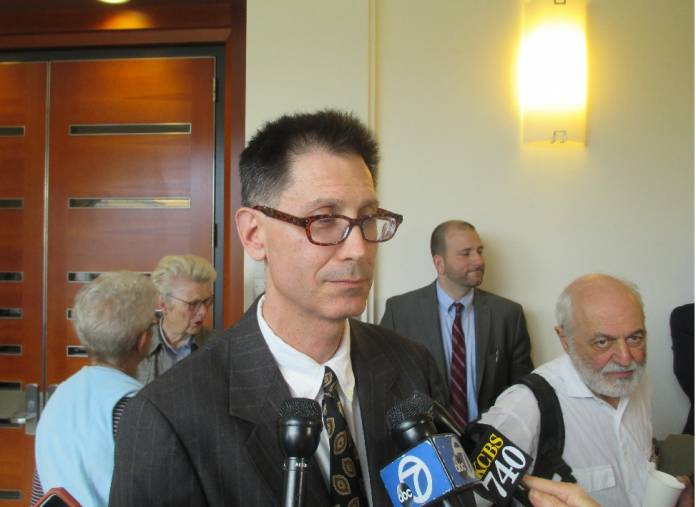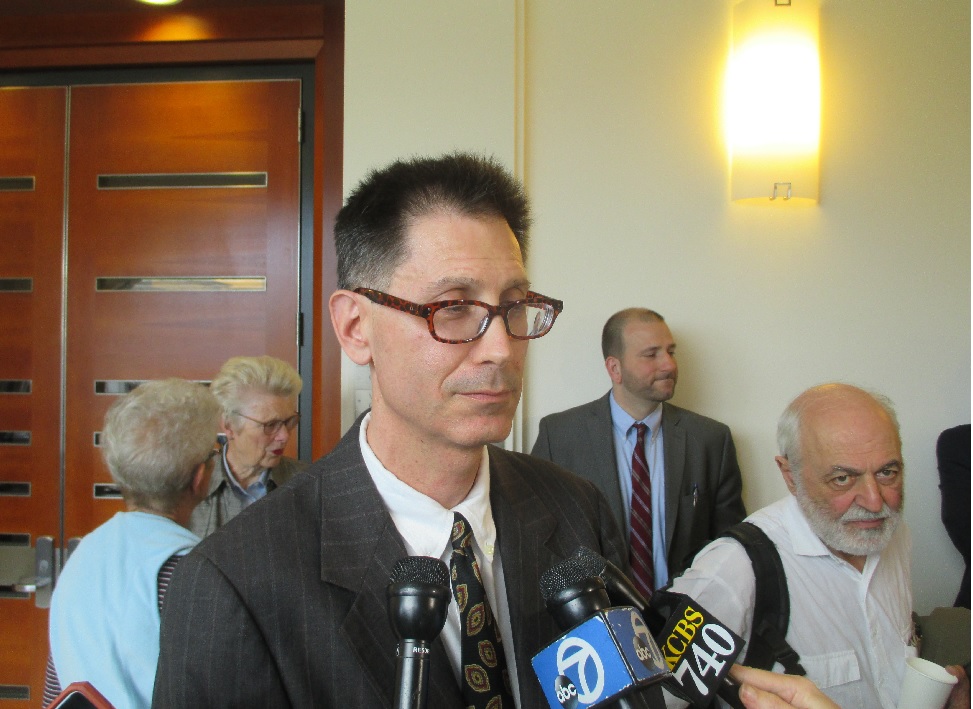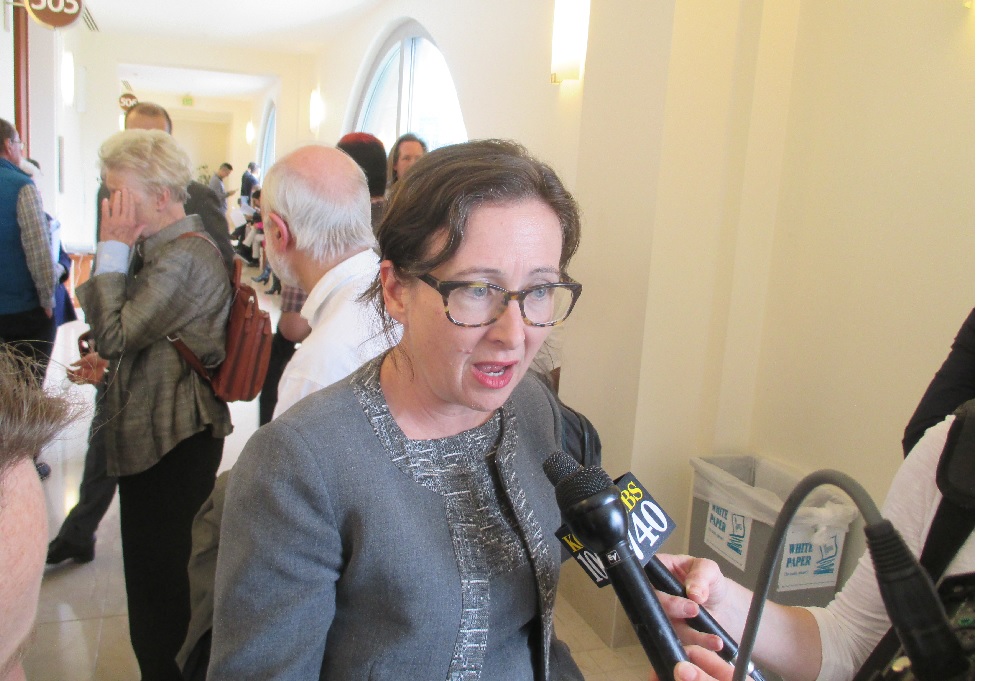
Gavin Newsom’s lawsuit against San Francisco appears headed for a September trial after Judge Susan Bolanos tentatively decided not to give either side summary judgment.
That ruling came after the lawyer for the State Lands Commission, which Newsom chairs, made the stunning argument that the voters of San Francisco should not have the right to make land-use decisions on the waterfront because those should be left to the experts at the Port Commission.

It leaves Newsom, who is running for governor, in the odd political position of saying that the voters can’t be trusted.
Deputy Attorney General Joel Jacobs also argued that the main issue at hand was money – how much the Port could make from commercial development. In essence, he said that the five commissioners, all appointed by the mayor, should be allowed to approve whatever sort of tall buildings they wanted if it would bring money into the agency, and the rest of San Francisco should have no check on their decisions.
“The more revenue generated by profit-making projects, the more the Port can do to promote other uses,” he said.
The Lands Commission is trying to overturn Prop. B, a 2014 ballot measure that passed by nearly 60 percent. It requires a vote of the people before any project can exceed existing height limits on the waterfront.
The implications of the case are huge: If Newsom’s arguments stand, communities all over the state – from Richmond, which has its own waterfront protection laws, to Los Angeles, Long Beach, and San Diego – could lose the right to vote on waterfront development.
Jacobs, in a tortured argument that seems to defy the state Constitution, said that voters – unlike members of the Port Commission – are unworthy of making decisions: “we don’t understand if they are acting for the right reasons, as we would if it were a public body,” he said.
Help us save local journalism!
Every tax-deductible donation helps us grow to cover the issues that mean the most to our community. Become a 48 Hills Hero and support the only daily progressive news source in the Bay Area.
He referred to elections as a “black box” and said they lacked the transparency of a Port Commission proceeding.
Let us take a step back and try to understand what Jacobs – and by implication, Newsom – is saying.
The initiative, referendum, and recall go back to Gov. Hiram Johnson, who ran for office in 1910 as a populist opponent of Southern Pacific Railroad. SP was a huge powerhouse that controlled the state Legislature and much of the City and County of San Francisco.
Johnson pushed the initiative and referendum as a check on the power of SP; if the voters had the right to put their own legislation on the ballot, and to challenge bills that SP’s corrupt pals had pushed, it might be possible to break the stranglehold of powerful interests in the state.
The whole idea was that elected and appointed officials couldn’t always be trusted on issues that might require them to take on their corporate masters, and the voters should have the final word.
In this case, the Port Commission, whose members all owe their jobs to a mayor who is in favor of a lot of new development, including on the waterfront, decided to allow a super-luxury condo project and were ready to allow the Warriors to build a stadium on Port land. Were they really “acting for the right reasons” — or did political pressure and lobbying have something to do with it?
That commission was also ready to let Forest City build a 380-foot tower on land that the Port staff thought should be limited to 90-foot buildings.
The voters decided that was a bad idea. Then they decided that if the Port wants to build mega-projects on the waterfront, it should require a citywide vote (not just the approval of a majority of a five-person panel who reports only to the mayor).
What, exactly, is the problem with that, and why does Newsom want to challenge it?
I asked Jacobs after the hearing, and he said that “the initiative is an important part of the state Constitution” – but not in this case. In this case, he said, the Port Commission should be the only agency with the authority to make decisions on waterfront development.

Christine Van Aken, the deputy city attorney who represented the city, told me she thought that was more than a bit of a stretch. “I found it ironic that they argued that a process where the voters decide is less transparent than an appointed body,” she said.
(I recognize that there are a lot of problems with the initiate process in California, starting with the fact that it’s way too dominated by money. Obviously, you shouldn’t be able to use an initiative to take away people’s civil rights. But San Francisco has a long history of using initiatives to fight big developers who controlled the mayor and the supes, and this is just the latest chapter.)
There was plenty more to discuss in the hearing.
Jacobs kept going back to his claim that the Port – which oversees the state trust of waterfront land – has to consider how much money it can make from development. He said that the actual trust issues – like maritime used and public access – can only exist if the Port agrees to high-end real-estate development.
Van Aken didn’t raise the issue, but I can: Why is that the case? Do the mayor, the supes, and the voters not have the right to raise taxes or issue bonds to pay for upgrades to the Port? Could we not as a city decide to devote more public money to devoting the waterfront to open space and recreation? Is the only possible source of revenue highrise commercial development?
The Port needs a huge amount of money to upgrade aging infrastructure. One source of that is selling off (or leasing) waterfront land for development. But there are other sources, too – and the decision of how much money to allocate to the Port and where it should come from is a much larger policy matter that belongs with the mayor, the board and the voters.
Besides, this is all about the tidelands trust, and the Burton Act, which shifted control of the Port of San Francisco from the state to the city – and nowhere in any of that legislation is there any discussion of the importance of developing land for revenue.
Jacobs also tried to argue that somehow the public trust was violated when the voters limited the height of buildings, and thus (maybe) costs the developers and (maybe) the Port money.
But again: dubious. “We still haven’t heard any argument that the public trust requires 380-foot towers at Mission Rock,” Van Aken said. “The State Lands Commission can’t prove that the Port would receive less revenue” from projects with lower height.
In fact, the projects that have gone forward under Prop. B are better projects – and the developers and the Port are still going to make money.
Both sides had asked the judge to rule summarily in their favor. Judge Bolanos didn’t issue a final ruling, but she said she was leaning toward rejecting both of those claims and setting the issue for a trial Sept. 11.
I don’t know what Newsom is thinking. At a key point in the early stages of his bid for governor, he is about to be in the middle of a critical court case that will put him in opposition to environmental groups like the Sierra Club – but also will have him arguing that the voters in California cities can’t weigh in on development issues.
And as the case goes to trial, it’s just going to get more and more press.

you definitely don’t have to vote for him, no matter what. I would imagine it would be like voting for HRC in CA, where the ballot was hardly worth the ink used to print it.
CA Republicans are largely cut from a different cloth from their East of the Rockies compatriots.
When was this? And the Democrats still have their DCCC/ CCCP schtick.
We need a new party. Or an independent governor.
Too bad my taste for fresh California oysters has not expired too.
Oyster farmer bought his business knowing the lease was expiring, and it did.
I think a one-party Democratic government has done the country quite well, thank you.
There’s no affirmative action program for monsters in politics.
You can get much worse than Newsom. Were you around for Pete Wilson? Remember when Dan Lungren ran for governor?
Newsom would be like eating dog food. A Republican would be like eating strychnine.
This is not going to play well in San Francisco – voters want a say in what happens to the waterfront.
Now that’s funny. It means we voters have something in common with politicians.
Voters, when ill informed, are just as untrustworthy as self interested profit oriented individuals, economic organizations and graft bought politicians. Give voters good information and a ligitimate voice and they, due to sheer numbers in a majority, are the best possible arbitrators of DEMOCRATIC justice. Gavin will never get it and Capitalism’s captains will never stand for it!
LOL
You are correct. People who want to produce food crops, like oyster farmer, and diary cow and ranchers are being thrown off the public lands. Only housing and big developments need apply. Food crops are not important unless they can be used as an excuse to leverage water rights, such as the water in the Delta that needs to go to the ocean to promote salmon fishing.
A really clean operation like oysters farming, is too hazardous to the public to be allowed to continue. Besides, it will guarantee the price of seafood to go up for those who are allowed to produce it in such healthy environments as our Gulf Coast, Thailand and China. Happy eating folks. Your dinner will not be locally grown if the state can manage to kill the food producing industries off to make room for more housing on the California cost. We may still get imported seafood from Oregon and Washington unless those states decide to clamp down too.
If they don’t trust us how can we trust them? Sacramento is busy removing the rights of the citizens of the state in the biggest power grab we have seen in a long time. The media is not covering this. Let’s start with SB65 Wiener’s By-Right bill that has passed the Senate and is making its way through the Assembly now. Add to that a host of other bills designed to raise the threshold for passage of voter initiatives and hand over public property to private corporate interests, and we have a big power grab going on in Sacramento that will make this insult to the voters and taxpaying public an every day occurrence. Demand more from the media. Threaten to oppose everyone who supports these bills. Share this with your friends around the state,
It is really simple. Newsom wants to be governor. Running for governor takes a lot of money. Developers have a lot of money, and they will spend it on a candidate that favors them. Newsom wants their money, so he does what they want.
In such a choice, I would have to go with the Republican. I have never voted for Newsom, and I will never vote for Newsom. Besides, what’s the difference. Newsom is way more Republican than Democrat.
Funny, how the vote in the 1990’s that give us the height limits were never an issue, not even for Newsom UNTIL now. Follow the money.
I hope I don’t have to vote for this creep.
Its kind of ironic because some economically depressed coastal city governments in CA are promoting coastal commercial and industrial projects for economic development but are getting push back from the State Lands and the Coastal Commissions because of environmental and non-maritime use reasons. What seems to really be going on is when communities are divided, the “loser” goes to the State to get another bite of the apple. Its actually just the local fight getting escalated into a State arena.
Vote for the republican. One-party government has never done the country well.
The voters can’t be trusted? Who does he think he is…James Madison? Thomas Jefferson?
Why is waterfront prop not subject to the Coastal Commission?
I so don’t want to have to choose between this schmuck and a Republican for the next governor.